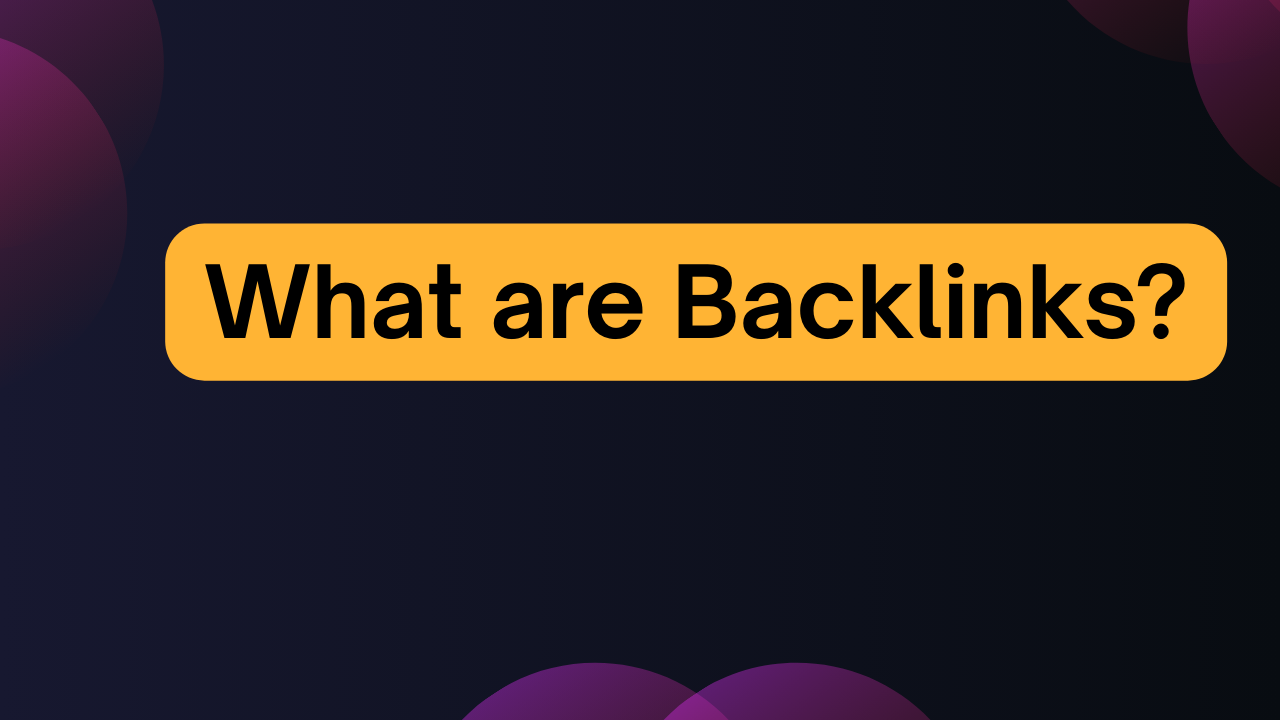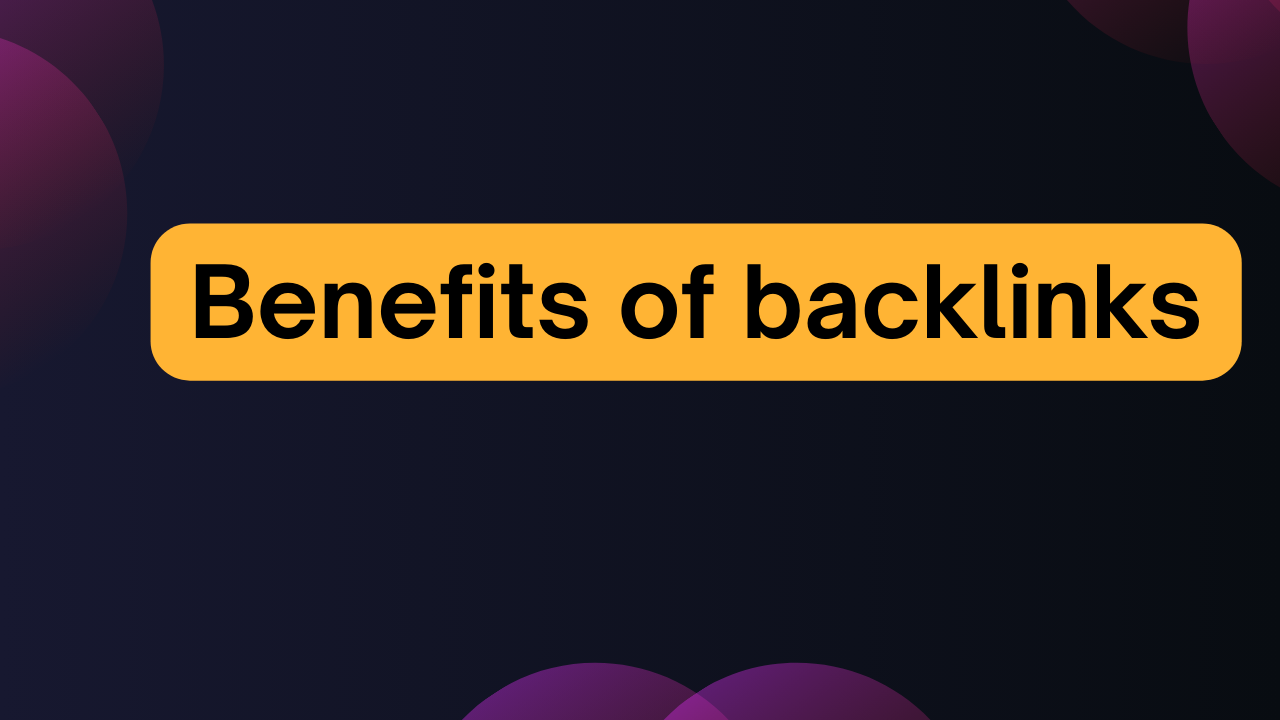What are Backlinks?
Backlinks, often referred to as inbound links or incoming links, are links from one website that point to another. In simple terms, if another site includes a hyperlink that directs users to your webpage, that’s considered a backlink. Search engines like Google and Bing view backlinks as signals of trust and authority because they indicate that other websites find your content valuable enough to reference. The number of backlinks you earn, along with their quality and relevance, plays an important role in determining how well your site ranks in search engine results.
Backlinks are a strong signal of how trusted and popular your website is among users and other publishers online. Effectively building, monitoring, and analyzing backlinks is a key component of any successful search engine optimization (SEO) strategy. To attract more organic traffic and improve visibility on search engines, businesses need to focus on both on-page and off-page SEO. On-page SEO involves optimizing content so that search engines and readers clearly understand the purpose and value of your website. Off-page SEO, on the other hand, is about proving your site’s authority and credibility beyond its own pages. The most powerful way to showcase this authority is through high-quality backlinks, which serve as endorsements from other sites.
Links are the essential connections that hold the web together, allowing individual documents to interconnect seamlessly. These links can be categorized into two main types: internal links and external links. Internal links connect pages within the same domain, helping users navigate smoothly across a website. External links, on the other hand, point to pages on different domains and serve a variety of purposes, such as:
- Providing additional context to the reader
- Supporting or backing up a claim made in the content
- Citing or referencing a credible source
- Recommending related content or resources
- Adding trust and authenticity to the information
Every link on a webpage exists to deliver extra value to the reader, which makes an outgoing link an important asset. It’s important to recognize that every link has a direction—on the page where it’s placed, it functions as an outgoing link, while for the destination page, it acts as an incoming link. This incoming link is what we commonly call a backlink.
Search engines view backlinks as signals of trust and credibility. When another site links to your content, it suggests that there has been an editorial decision to reference your page, indicating its relevance and usefulness. Because of this, backlinks are treated as intentional endorsements by search engines.
For your website, earning quality backlinks means proving that your content provides value. They remain one of the most influential ranking factors, directly impacting how well your site performs in organic search results and how much traffic it can attract.
One of the key reasons Google became the world’s leading search engine is its early recognition of the importance of backlinks in SEO. When Google was launched in 1998, it introduced a groundbreaking ranking system called PageRank, named after its co-founder Larry Page. This algorithm measured not only the number of links pointing to a webpage but also the authority of those links.
The idea behind PageRank is that not all backlinks carry the same weight. Links from pages with higher authority are considered more valuable than those from less authoritative sources. For example:
- Page A has 200 backlinks
- Page B has 20 backlinks
If both pages cover the same topic, Page A is more likely to rank higher in search results because it has significantly more backlinks, making it more authoritative. As a result, if your website earns a backlink from Page A, that link would be considered more valuable than a backlink from Page B.
In essence, the PageRank algorithm assigns authority to each webpage based on the quality and quantity of its inbound links. This principle still influences how search engines evaluate content today, even though modern ranking algorithms have become far more sophisticated.
How PageRank Distributes Authority
PageRank works as an iterative algorithm, meaning the calculation process repeats multiple times until the results stabilize. This is necessary because the authority of each page in a network depends on the authority of the others, creating a cycle of interdependence.
To understand this, consider a simple example with four web pages:
- Page A links to Page B and Page C, and it receives a backlink from Page B.
- Page B links to Page A and Page D, and it has backlinks from Page A and Page C.
- Page C links to Page B and Page D, and it receives a backlink from Page A.
- Page D does not link out but has backlinks from Page B and Page C.
To compute the authority for Page D, we need to know the authority scores of Page B and Page C. However, Page B’s authority also relies on Page A and Page C, while Page A’s authority is itself influenced by Page B. This creates a cycle where every page’s authority depends on the others.
Even in this small network, the relationships quickly become complex. The algorithm solves this by running calculations repeatedly, with each round refining the authority values until they reach a stable state. While the math behind it is not extremely complicated, applying it to the trillions of links that exist across the internet requires enormous computational power.
What’s domain authority?
Domain authority refers to the network of URLs and internal links that exist within your own website. Just like backlinks from external domains, internal links also transfer authority from one page to another, helping search engines understand the relative importance of different pages on your site.
It’s natural that websites with strong reputations carry greater authority than smaller or lesser-known sites. For example, a backlink from a major publication like CNN is far more valuable than one from a small local blog. This is because authoritative domains pass more credibility and trust through their links.
Consider a case where your homepage receives a backlink from a local news site. That authority strengthens your homepage, but because your homepage also links to other internal pages, some of that authority is distributed further across your site. As those pages link outward to others, the authority continues to flow through your internal linking structure. Pages that are closer to the top of this chain receive more link equity, making them stronger in the eyes of search engines.
This process explains why large brands often dominate search rankings. Their powerful domains, supported by extensive backlink profiles and strategic internal linking, allow even newly published pages to achieve strong visibility in search results.
Quantity and quality: When it comes to backlinks, both matter
While calculating the exact value of link authority is highly complex and not fully transparent, understanding the basics of how PageRank functions gives us some practical guidelines to follow when building backlinks.
- Aim to attract as many backlinks as possible to strengthen your site’s authority.
- Prioritize backlinks from reputable and authoritative websites, as they carry more weight.
- Use common sense—if a website appears trustworthy and well-established, its backlink is likely more valuable.
- Remember that gaining more backlinks can benefit your entire website, as link equity flows through internal links.
In short, successful SEO requires a balance of both quality and quantity when it comes to backlinks. A strong mix of authoritative links and a growing backlink profile can significantly improve your search visibility.
Benefits of backlinks
Backlink building is a crucial element of SEO because search engines rely on backlinks to assess the authority and relevance of a page. A backlink acts as a signal that other websites find your content valuable. However, not all backlinks hold the same weight—search engines evaluate them based on the quality and credibility of the linking website, not just the total number of links pointing to your site.
High-quality backlinks can boost your search rankings by demonstrating trust and authority. The greater the number of strong backlinks your site earns, the more likely it is to appear higher in search engine results. Beyond ranking, backlinks also play an important role in brand visibility:
- Improved discovery: Popular and authoritative websites linking to your content make it easier for new audiences to find you.
- Referral traffic: Backlinks can send targeted visitors directly to your site from sources already aligned with your niche.
- Business growth: More exposure means more opportunities to attract potential customers into your marketing funnel.
In short, backlink building not only supports higher search rankings but also strengthens your online presence and brand visibility across the web.
How to evaluate backlinks for relevance
Now that you know what backlinks are, it’s important to understand how search engines evaluate them for relevance. Authority is one factor, but Google also looks closely at whether a backlink is contextually related to the target page. In other words, does the topic of the website, page, or anchor text align with the content being linked to?
Let’s look at three examples of backlinks to a webpage selling guitar picks:
-
Link 1
The website is popular in the music industry.
The web page containing the link is about guitars.
The anchor text is “Read more here.”
Although the anchor text doesn’t provide relevance, both the website and page are topically aligned, making this a useful link. -
Link 2
The website is well-known in the automotive industry.
The web page is about refueling.
The anchor text is “Gasoline vs. diesel.”
This link offers no relevant signals. Despite coming from an authoritative domain, Google may assign little to no value because it is unrelated to the topic. -
Link 3
The website is less popular but related to guitar equipment.
The web page is about guitar picks.
The anchor text is “Best guitar picks.”
Here, the site, page, and anchor text are all relevant. Even though the site is less authoritative, the clear topical relevance makes this a highly valuable backlink.
In practice, you may receive backlinks from many different sources. Some may come from irrelevant sites, which usually neither help nor harm your rankings. The links that provide the most benefit are those that are both authoritative and highly relevant, as they send strong signals to Google that your site is a good match for specific topics.
Once your on-page SEO is in place, building backlinks is the single most effective step to improve rankings. However, earning backlinks can be challenging—it requires convincing another site owner that linking to your content will improve their own page.
Instead of cold-emailing random people for links, it’s far better to follow professional and proven strategies for backlink building. This ensures your efforts are both effective and sustainable in the long run.
Link building
Link building refers to the practice of actively acquiring backlinks to your website. It is a specialized area of SEO that requires strategy, patience, and consistent effort. While mastering link building takes time, beginners can start by simply understanding the value of backlinks and engaging in activities that naturally encourage other websites to link to them.
Linking to other web pages is at the core of how the internet functions. By creating content that is useful, relevant, and shareable, you increase the likelihood of earning backlinks without needing overly complex strategies.
The real risk lies in neglecting link-building efforts altogether. Without taking part in activities that can generate backlinks, your website has a very limited chance of improving its visibility and rankings in search engines.
Link building is rarely a straightforward process—it often involves a degree of trial and error. What works for one website or niche may not work as effectively for another. The key is to experiment with different approaches, track the results, and refine your strategy over time.
By testing various methods, such as outreach, guest posting, or creating link-worthy resources, you can identify which tactics deliver the best outcomes for your website. This continuous learning process helps you build a more sustainable and effective link-building strategy.
Link Generation Ideas
Backlink generation typically happens in two main ways:
- Organic discovery: Someone finds your content naturally and chooses to link to it.
- Outreach-driven: You place your content in front of the right people, and they decide to link to you.
Link generation is similar to lead generation—you need to get your content in front of the right audience. The effectiveness of your approach depends on your website’s content type, the businesses or individuals who might link to you, and the strategies you use to reach them.
Entities That Can Help You Earn Backlinks
- Suppliers and retailers: Leverage existing business relationships by requesting to be featured on their listings or resources pages.
- Partnerships: Collaborate with business partners on co-promotions, webinars, or feature content that benefits both audiences while earning backlinks.
- Local community: Get involved by sponsoring events, hosting meetups, or supporting local schools and universities. Community initiatives often earn media mentions and links.
- Testimonials: Provide case studies or reviews for products and services you use. Companies often showcase these stories, including a link back to your site.
- Charities: Supporting charitable organizations builds goodwill and often results in online mentions and backlinks.
- Niche bloggers: Build relationships with passionate bloggers in your industry. Offer guest posts, interviews, or product samples to generate authentic mentions.
- Press: Journalists are always looking for stories. Pitch compelling business updates or product launches, and your story could spread across multiple outlets.
With all these strategies, avoid directly asking for links. Instead, focus on activities that provide value, where backlinks occur naturally as a byproduct. The most effective methods offer business benefits even if no link is gained.
Frequently Asked Questions
What is an example of a backlink?
A backlink is when one website links to another using anchor text. For example, a blog article might link to a research study as a source. These references are found everywhere across the web, especially on reputable blogs and media sites.
How do backlinks improve SEO?
Backlinks improve SEO by boosting your website’s authority and helping your pages rank higher for target keywords on search engine results pages (SERPs). Quality matters more than quantity—links from authoritative websites have a much stronger impact than links from low-quality sites.
How do I get backlinks from high-authority sites?
The most effective way is to create original, valuable content such as blogs, infographics, or videos. High-authority websites often cite strong sources, increasing the chances of earning backlinks. You can also increase visibility by linking to authoritative sources in your own content, building connections over time.
The Importance of Link Building
SEO relies on three core elements: keyword research, on-page optimization, and backlinks. Focusing on just one or two of these will limit results. Among them, backlinks are often the most powerful—they improve rankings, build awareness, and drive referral traffic.
Link building should be a central part of your SEO strategy. Beyond SEO benefits, it also increases visibility and strengthens your brand’s reputation online.
Edit Profile
Help improve @KR

Was this page helpful to you?
Contact Khogendra Rupini
Are you looking for an experienced developer to bring your website to life, tackle technical challenges, fix bugs, or enhance functionality? Look no further.
I specialize in building professional, high-performing, and user-friendly websites designed to meet your unique needs. Whether it’s creating custom JavaScript components, solving complex JS problems, or designing responsive layouts that look stunning on both small screens and desktops, I can collaborate with you.
Create something exceptional with us. Contact us today
Open for Collaboration
If you're looking to collaborate, I’m available for a variety of professional services, including -
- Website Design & Development
- Advertisement & Promotion Setup
- Hosting Configuration & Deployment
- Front-end & Back-end Code Implementation
- Code Testing & Optimization
- Cybersecurity Solutions & Threat Prevention
- Website Scanning & Malware Removal
- Hacked Website Recovery
- PHP & MySQL Development
- Python Programming
- Web Content Writing
- Protection Against Hacking Attempts



